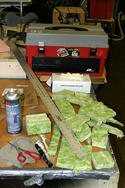The Center for Neighborhood Technology (CNT) has produced a housing and transportation index (the "H&T Index"), something that has been advocated by Secretary of Housing and Urban Development (HUD) Shaun Donovan and Secretary of Transportation Ray LaHood. The concept is certainly worth support. Affordable housing and mobility are crucial to the well-being of everyone, which translates into a better quality of life, more jobs and economic growth. read more »
Housing
The Millennial Metropolis
Back in the 1950s and 60s when Baby Boomers were young, places like Los Angeles led the nation’s explosive growth in suburban living that has defined the American Dream ever since. As Kevin Roderick observed, the San Fernando Valley became, by extension, “America’s suburb” – a model which would be repeated in virtually every community across the country. read more »
Denver Relocation: The Search for Higher Ground
In 2003 our family relocated to Folsom, California from Carson City, Nevada, after my father-in-law was diagnosed with Parkinson’s disease, to help with his care. In many ways the transition felt like an immersion into what Joel Kotkin calls the “city of aspiration.” Folsom, a Sacramento region suburb of 50,000, was notable for its robust economy, impressive K-12 schools, world-class bike paths, and low crime. It offered a favorable environment for families and upwardly mobile professionals.
Seven years later, the landscape has certainly changed. My father-in-law has passed on, and California's high cost of living continues to have a profound impact on our personal finances. This scenario, coupled with the currently dire economic picture, gave my wife and I pause to again rethink our future path. After many long nights of thoughtful dialogue, we came to the realization that it was time to break ties with the Golden State. In early summer, Denver will become our next home.
This pending relocation offers our family an opportunity to embrace what I call “the geography of place”— the merging of what one wants to do with where read more »
All In The Family
For over a generation pundits, policymakers and futurists have predicted the decline of the American family. Yet in reality, the family, although changing rapidly, is becoming not less but more important.
This can be traced to demographic shifts, including immigration and extended life spans, as well as to changes of attitudes among our increasingly diverse population. Furthermore, severe economic pressures are transforming the family--as they have throughout much of history--into the ultimate "safety net" for millions of people. read more »
The Great Deconstruction - First in a New Series
History imparts labels on moments of great significance; The Civil War, The Great Depression, World War II. We are entering such an epoch. The coming transformation of America and the world may be known as The Great Deconstruction. Credit restrictions will force spending cuts and a re-prioritization of interests. Our world will be dramatically changed. There will be winners and losers. This series will explore the winners and losers of The Great Deconstruction.
***
The phrase, The Great Depression, was coined by British economist Lionel Robbins in a 1934 book of the same name. read more »
New Urbanism, Smart Growth, & Andres Duany: A Critique From Suburbia
In 1998 Hollywood introduced us to a new star when it released The Truman Show, shot on location at Seaside in Florida. No I’m not talking about Jim Carrey, Laura Linney or Ed Harris. I'm talking about none other than Andres Duany.
A few months ago, I stayed at the magnificent WaterColor Inn, which is in the neighborhood adjacent to Seaside. read more »
Queensland, We’ve Got a Problem
Queensland Premier Anna Bligh MP has a problem. Reacting to sensationalized media reports of runaway population growth as well as an infrastructure lag revealing itself in everything from mounting congestion to a lack of hospital beds, Queensland residents are starting to say ‘enough.’ The prospects of continuing population growth at around 2.5% or 100,000 people per annum, despite the economic benefits this brings, are increasingly unpopular, something that gets the attention of most politicians. read more »
- Login to post comments
EPA Joins the Green Building Party
By Richard Reep
Well into the last decade, green design and smart growth operated as two separate and distinct reform movements. Both were widely celebrated in media, academic and planning circles, seeing themselves as noble causes albeit underdogs in the struggle against the mighty capitalistic enterprise of real estate development. Starting in 2009, the frozen credit market has kept private development moribund, and these two movements are somewhat moot as development takes a cease-fire. read more »
Green Jobs Sink Down Under
Remember when President Obama declared that insulation was sexy? In the wake of the global economic downturn, a “green jobs” formulation has been launched, not just here, but in every major world capital. While the White House’s financial and rhetorical commitments to the creation of green jobs are significant, no administration has made these policies as central to their government as that of Prime Minister Kevin Rudd in Australia. The results there should provide a cautionary tale for President Obama, whose trip “Down Under” is currently scheduled for June. read more »
America in 2050 -- Where and How We'll Live
The presence of 100 million more Americans by 2050 will reshape the nation's geography. Scores of new communities will have to be built to accommodate them, creating a massive demand for new housing, as well as industrial and commercial space.
This growth will include everything from the widespread "infilling" of once-desolate inner cities to the creation of new suburban and exurban towns to the resettling of the American heartland -- the vast, still sparsely populated regions that constitute the majority of the U.S. landmass. read more »





















